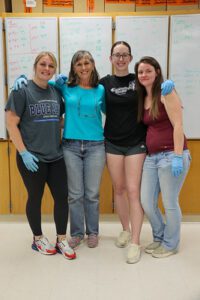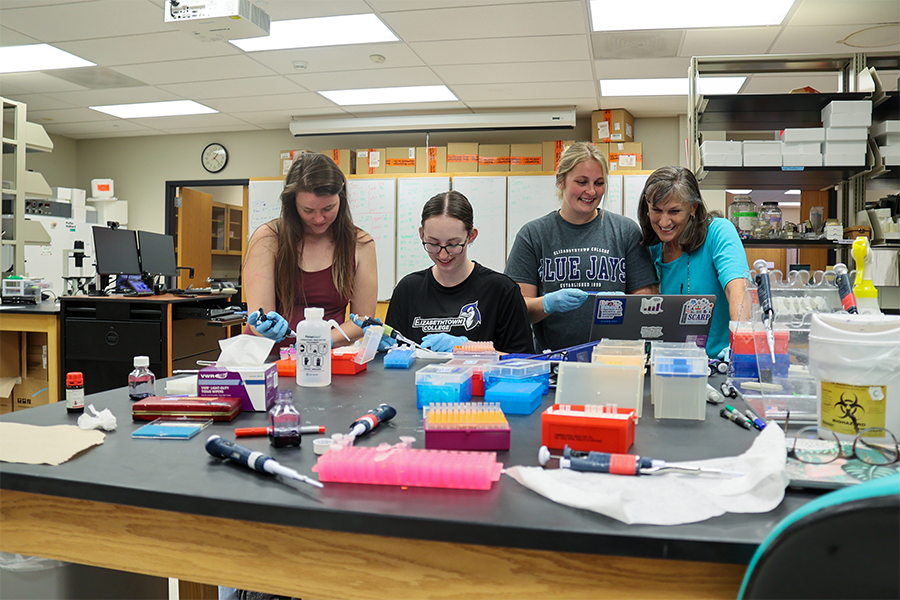Sophia Berry ’25, Kara Davies ’26, and Kassandra Zivny ’24 were hard at work this summer, researching and testing new approaches to cancer treatment as part of the Summer Creative Arts and Research Program (SCARP).
The three Blue Jays worked alongside faculty mentor Professor of Biology Jane Cavender to analyze various chemotherapy drugs to evaluate if they are successful in killing more cancer cells than healthy cells.
Title of Research
Elucidating the Effect of the SV40 T-Antigen Oncoprotein Expression to the Alteration of Splicing Protein Profiles and the Effect on the Downstream Splicing Targets
Student Researchers
Sophia Berry ’25 (Biotechnology major), Kara Davies ’26 (Biology, Pre-Physician’s Assistant major), and Kassandra Zivny ’24 (Biotechnology major)
Faculty Mentor
Jane Cavender, Professor of Biology
What are you researching?
Berry: My project aims to identify CD44 isoforms that may be present in Human Diploid Fibroblast cells (HDF). Our HDF cells are transformed with the SV-40 T-antigen virus, which allows us to compare our research to other virally induced cancers such as HPV, EBV, HBV, etc. CD44 is a transmembrane protein in the cellular proliferation pathways, such as MAPKkk and AKT. Cells can have different isoform selections of CD44, resulting in different cellular signaling cascades. The identification of CD44 isoform selection and how CD44 signaling varies between transformed cells and “normalized” cells will allow us to determine if CD44 is a potential chemotherapeutic for virally induced cancers.
Davies: Withaferin A is a chemotherapeutic and these transformed cell lines are transfected with Sv-40 T-antigen to simulate cancer cells. We plan to research the mechanism that withaferin A utilizes to kill these cells through a combination of RTPCR, western blot assays, and cell counting experiments.
Why did you choose this topic?
Berry: I chose this topic because I was interested in the protein CD44. CD44 is a downstream target of SAM68 (an alternative splicing protein), and we have high amounts of SAM68 in our HDF cells transformed with SV-40 T-antigen. I was intrigued by how high amounts of an alternative splicing protein could contribute to CD44 inform selections, impacting cellular functioning.
Davies: I worked extensively with withaferin A in the spring when I took Dr. Cavender’s cell biology lab. I learned how it affected a human lung carcinoma cell line, but I want to be able to apply this knowledge to different kinds of cancers.
What was the most interesting aspect of this research?
Berry: The most interesting aspect of our research is that it could help someone. Approximately 20% of cancers are induced by a virally transforming agent and greater than 90% of cancer-related deaths are due to metastasis. CD44 is involved in cell migration through epithelial-mesenchymal transitions (EMT). Thus, if we can target CD44 using chemotherapeutics, we could potentially limit cell migration.
Davies: The most interesting aspect of this research is comparing the real-life experiments to what I learned while taking cell biology. Having conducted numerous preliminary experiments along the way, it was exciting to see all the pieces fall into place as the research progressed.
What are you hoping to accomplish through this research?
Berry: I am hoping to determine CD44 isoforms within HDF cells and determine how downstream cellular signaling is different in “normalized” cells and virally transformed cells.
Davies: I am hoping to accomplish a better understanding of cancer.
Talk about working with your mentor. How have they helped you throughout this experience?
Berry: Dr. Cavender has helped me throughout this experience by always supporting my passion for research. She has always encouraged me to be creative when designing experiments, which opened new doors for me to learn academically. When a professor lets you create ways for who you are to accomplish your research, it is challenging, but it is the best way to learn. Being in Dr Cavender’s lab has taught me much about how a lab works, how to set up an experiment properly, and how to troubleshoot when something doesn’t go right; from this, I have gained the most knowledge and experience. I will forever appreciate Dr. C as a mentor for always supporting my ambitious ideas.
Davies: Dr. Cavender urged me to hit the ground running and to throw myself into my research. She’s held me to high expectations so that I can gain the most from this experience and learn all that I possibly can. She’s also done a fantastic job at explaining the what/why/how of the experiments that we are utilizing.

